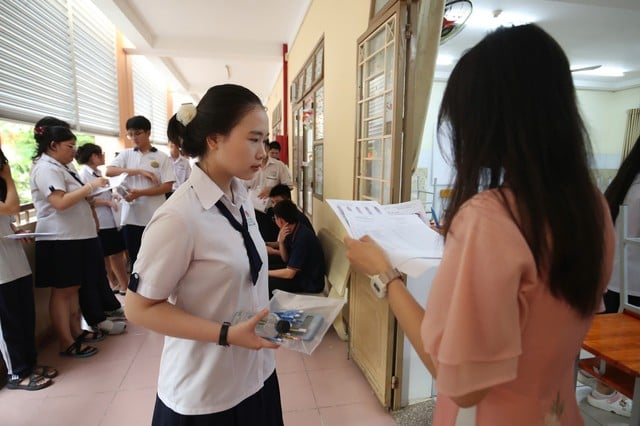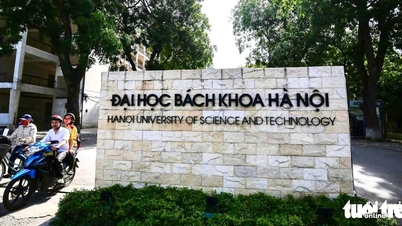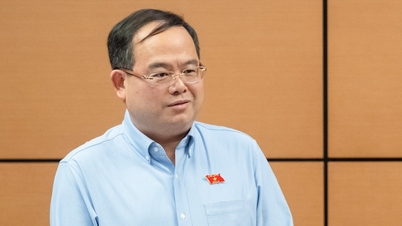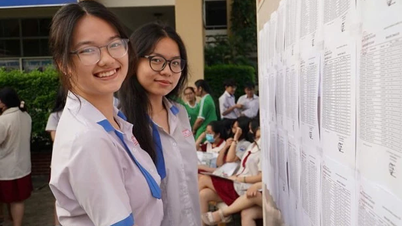Let's look back at the major changes to the high school graduation exam and the shocking incidents to hope for an increasingly better exam.
8 MAJOR IMPROVEMENTS
From 1975 to 2025, it can be said that Vietnamese education has undergone at least 8 major improvements in assessment and recognition of high school graduation.

Candidates taking the 2024 high school graduation exam, the final exam under the old general education program
PHOTO: NHAT THINH
In 1975, the high school graduation exam consisted of 6 subjects, including politics . Before 2000, the high school graduation exam consisted of 4 subjects: 2 compulsory subjects (math, literature) and 2 elective subjects from among physics, chemistry, biology, history, geography announced at the end of March every year.
In the period 2000 - 2005, the high school graduation exam consisted of 6 subjects (essay format). In 2006, the high school graduation exam consisted of 6 subjects, with foreign languages being multiple choice.
From 2007 to 2013, the high school graduation exam kept 6 subjects, the objective test format was used for physics, chemistry, biology, and foreign languages; the rest was essay.
In 2014 - 2016, called the national high school exam, the number of subjects was reduced to 4 (2 compulsory subjects: literature and math; 2 elective subjects from chemistry, physics, geography, history, biology, foreign language); objective multiple choice tests for foreign language, physics, chemistry, biology and essay tests for math, literature, history and geography.
Since 2015, candidates have to take 4 exams, including 3 compulsory subjects (math, literature, foreign language) and elective subjects in history, geography, physics, chemistry, biology. For the first time, the Ministry of Education and Training has decided to use the results of the national high school exam as the basis for university and college admissions.
In 2017 - 2024, the high school graduation exam will have 4 subjects/tests, including 3 compulsory subjects (math, literature, foreign language) and 1 optional combination test (combination of natural sciences or combination of social sciences). All exams will be in objective multiple choice format, except for literature which is an essay.
From this year, the exam is once again facing major changes due to the implementation of the 2018 General Education Program. This year, candidates will only take 4 subjects, including 2 compulsory subjects: literature and math; 2 subjects are optional from the 12th grade subjects. This is also the first year that some new subjects have appeared, included in the exam for candidates to choose from such as: information technology, technology... In addition to the literature subject, which is still an essay test, other subjects will be tested in the form of objective multiple choice with more diverse question formats.
Another special feature of this year's exam is that there are 2 types of exam questions and 2 exam regulations for 2 groups of candidates. In addition to the majority of 12th grade candidates, there are also about 25,000 candidates studying the 2006 education program (old program). These are the candidates who completed high school in 2024 but have not yet graduated or have graduated but re-taken the exam to have results to participate in this year's university entrance exam.
FROM THE "2 NO" EXAM TO THE EARTH-SHOCKING VIOLATIONS OF 2018
In 2006, the education sector was stirred up when supervisor Do Viet Khoa denounced a series of violations at the Phu Xuyen A examination council (formerly Ha Tay). According to Mr. Khoa, the supervisors at this examination site received compensation from the beginning to turn a blind eye to the school's staff and teachers throwing answer sheets into the examination room for students to copy. The Ministry of Education and Training then intervened, requiring the Ha Tay Department of Education and Training to re-grade the exams at the examination councils with negative results under the supervision of the Ministry. In addition, a series of technical measures were applied to handle and rectify such as grading multiple-choice tests, grading inspections...
After this incident, a series of people involved were suspended from their duties and the Minister of Education and Training Nguyen Thien Nhan launched the "Two No" movement (say no to negativity in exams and achievement disease in education). 2007 was the first year of implementing this movement and the exam results shocked public opinion when the number of candidates failing the high school graduation exam reached about more than 1/3 of the candidates taking the exam, the high school graduation rate nationwide only reached about 67%, instead of more than 90% like many previous years, a decrease of nearly 25% compared to 2006.
Dozens of provinces have a high school graduation rate below 50%. Tuyen Quang is the locality with the lowest graduation rate in the country at 14.1% and the high school supplementary graduation rate is 0.22%; there are schools with 100% failure rate. To solve the problem of social impact, the Ministry of Education and Training must organize a second exam in the year for those who fail the exam so that they have a few months to review and have more opportunities to receive a high school diploma.
Implementing the "Two No's" movement, after a long period of silence, in 2011, the leaders of the Department of Education and Training of 11 provinces and cities in the Mekong Delta region met, discussed and agreed to issue separate exam marking instructions for this region in a relaxed direction to achieve "good" results. This was to circumvent the regulation on cross-marking of high school graduation exams.
In 2012, right after the exam ended, a 6-minute clip appeared online showing a scene of copying and throwing papers in the exam room. In the video, supervisor 2 sat at the back of the class, the students freely discussed and copied cheat sheets, and one supervisor even threw papers in for students to copy. The incident was determined to have occurred at the exam site of Doi Ngo Private High School (Bac Giang).
However, the most shocking violations were the 2018 exam. This year, the exam still kept the name of the national high school exam with two purposes: high school graduation and university admission. Therefore, serious violations occurred in the marking stage to use the results to consider admission to top universities, in a series of northern provinces such as Ha Giang, Son La, Hoa Binh. The incident led to 16 officials in the education and police sectors being prosecuted, hundreds of candidates were found to have incorrect exam results, in particular, one student's total score increased by 29.95 compared to the actual results.
A series of cheating cases in the 2018 national high school exam were also determined to be due to security loopholes, leading to exploitation to distort exam results. The Ministry of Education and Training has organized a review of the collective and individual responsibilities involved, and considered it a valuable lesson for the education sector and localities to review the exam organization and make changes for the 2019 high school exam.
Thanks to that, the exam was later "returned to its original name", returning to its original political mission of considering high school graduation. Universities and colleges have more autonomy in admissions, using a variety of admission methods other than graduation exam scores.
The seriousness and fairness of the high school graduation exam for the 2019-2024 period have been basically restored, regaining the trust of society.

Grade 12 students participate in the 2025 high school graduation exam trial. This is considered a historic high school graduation exam because it is the first time it is implemented according to the 2018 General Education Program and the final exam is implemented in 63 provinces and cities across the country.
Photo: Dao Ngoc Thach
In just a few days, the whole country will enter the historic high school graduation exam: the first exam to be conducted according to the 2018 General Education Program and the last exam to be conducted in 63 provinces and cities across the country. Since July, when the resolution on merging provinces and cities was implemented, the whole country has only 34 provinces and cities, from next year's exam there will be 34 exam councils.
As a high school graduation exam, public opinion wants the exam to be more serious but also needs to reduce pressure and cost. (to be continued )
Names of the exam through the ages
Regarding the name of the exam, after 1975, when the country was unified, the education model changed, the name of the Baccalaureate exam in the South before 1975 no longer existed, the exams were called: "10-year high school graduation exam" (applied to the 10-year system in the North), more commonly "High school graduation exam" (applied to the 12-year system in the South), then unified nationwide.
Period 2001 - 2014: called "High School Graduation Exam". Period 2015 - 2019, renamed "National High School Exam". This exam is organized with dual purposes: both to consider recognizing high school graduation and to serve as a basis for university admission. Period from 2020 to present, returned to the name "High School Graduation Exam".
Source: https://thanhnien.vn/nhung-lan-thay-doi-lon-ve-thi-tot-nghiep-thpt-trong-50-nam-185250618225855615.htm






![[Photo] Da Nang: Hundreds of people join hands to clean up a vital tourist route after storm No. 13](https://vphoto.vietnam.vn/thumb/1200x675/vietnam/resource/IMAGE/2025/11/07/1762491638903_image-3-1353-jpg.webp)









































































































Comment (0)